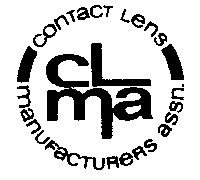SERVICE ORGANIZATION
Paying Tribute to a Dedicated Organization
The CLMA has worked diligently behind the scenes for 42 years to promote the contact lens industry and practitioners.
By Edward S. Bennett, OD, MSEd
The Contact Lens Manufacturers Association (CLMA) has worked since 1961 to educate contact lens practitioners and to shape vital national policies, laws and regulations that affect the contact lens industry. CLMA is composed of contact lens manufacturing laboratories and material, solution and equipment manufacturers in the United States and abroad.
CLMA's mission is to increase awareness and use of custom manufactured contact lenses. The objectives of the CLMA are to:
1. Educate eyecare professionals, the public and the industry about contact lens technology, features and benefits
2. Initiate and support legislation beneficial to CLMA membership, practitioners and patients
3. Sponsor, research and develop quality contact lens materials
4. Suggest and enforce industry manufacturing standards
5. Participate in seminars, conferences and congresses about eye health care
6. Promote the contact lens industry
For information on how to contact the CLMA, see Table 1.
|
TABLE 1 Contacting the CLMA |
|
| CLMA WASHINGTON
AREA OFFICE Box 368 Kensington, MD 20895-0368 (800) 556-2562 clma@mindspring.com FULFILLMENT CENTER WEB SITES |
|
CLMA-sponsored Programs
The CLMA regularly provides educational programs for laboratory representatives, including at its CLMA Annual meeting held each fall. CLMA has sponsored member programs for laboratory consultants as well as marketing seminars in recent years.
The educational arm of the CLMA is the Rigid Gas Permeable Lens Institute (RGPLI), a subcommittee of the CLMA that was initiated as an academic resource during the 1980s. Each year, the RGPLI helps over 900 optometric students in the United States and Canada gain "hands-on" GP fitting techniques and realize the benefits of incorporating GP contact lenses into their practices.
Academic Programs The RGPLI initiated numerous programs for Colleges of Optometry and Departments of Ophthalmology in the mid-1990s. It provides annual one-day symposia-workshop programs titled "Successful GP Practice for Today's Optometric Practice" at all U.S. optometric institutions. The RGPLI also sponsors a weekend "Cornea and Contact Lens Resident GP Educational Symposium," in which all cornea and contact lens residents at Schools and Colleges of Optometry participate in a "hands-on" two-day workshop that emphasizes GP specialty designs (bifocals, torics, irregular cornea, corneal reshaping). The RGPLI provides an ongoing newsletter to over 1000 student members in addition to providing student awards for GP excellence. Jane Beeman will join the CLMA as Academic Programs Coordinator for the RGPLI effective August of this year.
Resources The RGPLI has an extensive GP Professional Advantage Video Library for staff and practitioners. Available video topics include fitting and evaluation, problem solving, bifocal fitting, torics and irregular corneas, modification and verification, lensometry and radiuscopy. Laminated pocket cards are available for fluorescein pattern identification and bifocal fitting and problem solving. The "GP Lens Management Guide" is an illustrated pocket guide for spherical, bifocal, keratoconic and bitoric fitting, evaluation and problem solving. The GP Materials, Solutions and Accessories Guide appears annually in the October GP issue of Contact lens Spectrum. A number of consumer-based educational pamphlets are also available.
Web-based programs RGPLI offers resources, including a comprehensive list of available products from CLMA member laboratories on its Web site. The Web site also hosts a monthly online symposium on GP-related topics in which GP experts serve as faculty and often contribute relevant cases. An increasing number of GP clinical cases are also available on the Web site.
CLMA Membership
CLMA membership dues provide updated educational opportunities to CLMA members as well as funding to support academic programs and resources. Supporting your CLMA member laboratory when ordering contact lenses will support these many programs. Their membership funds research, education, resource development, legislation sponsorship, manufacturing standards and consumer awareness for the benefit of incorporating custom contact lenses into our contact lens industry.
Seal of Excellence
In 1994 the CLMA established a quality control testing program for its members. The Seal of Excellence manufacturing award program monitors contact lens quality for CLMA members who voluntarily enroll in the program. The program objectives are to:
1. Establish a self-check program of member labs' lens quality through a masked study program
2. Establish a program that would verify the overall consistency of GP lenses produced within the contact lens industry
3. Provide a mechanism for monitoring improvements in lens fabrication.
The Seal of Excellence Program allows a CLMA member laboratory to submit lenses into this masked study. The laboratory does not know when or from whom the lenses are ordered. A confidential third party collects the GP lenses from cooperating practitioners and forwards them, without laboratory identification, to the CLMA review board. This peer review board then examines the lenses for quality and tolerances outlined by the American National Standards Institute (ANSI).
The Seal of Excellence Program has and will continue to successfully monitor the overall quality and consistency of lenses produced by participating GP manufacturers. GP lens quality and patient satisfaction have greatly increased through the implementation of the Seal of Excellence Program. The program is entirely funded by CLMA members as a service to the contact lens industry.

The CLMA is the industry trade association for custom contact lens manufacturers. It serves its members as a proactive, self-governing group through a strict Code of Ethics. The CLMA monitors FDA activities and recommendations for change to ensure industry input. A CLMA representative serves on the ANSI Board to ensure that expert manufacturing advice is offered. Our staff attorney in Washington, DC, monitors Congressional legislation and provides an industry opinion.
Dr. Bennett is an associate professor of optometry at the University of Missouri-St. Louis and executive director of the RGP Lens Institute.



